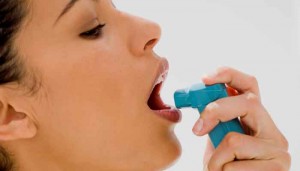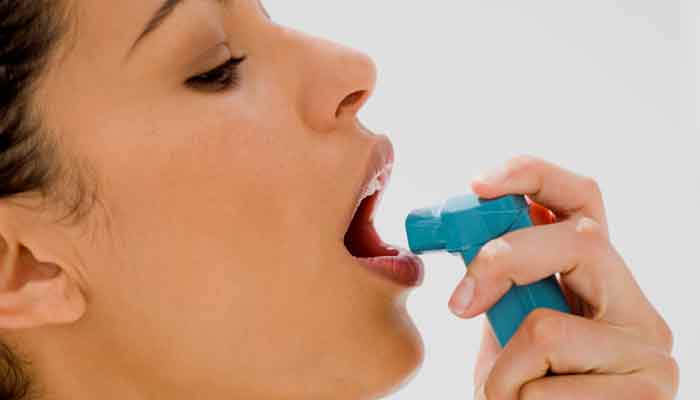

Courtesy: Zee News India
Although many people with asthma rely on medications to relieve symptoms and control inflammation, you can do several things on your own to maintain overall health and lessen the possibility of attacks:
Exercise. You don’t have to be sedentary if you have asthma. Regular exercise can strengthen your heart and lungs so that they don’t have to work so hard. Aim for 30 minutes of exercise on most days. If you’ve been inactive, start slowly and try to gradually increase your activity over time. Keep in mind that exercising in cold temperatures may trigger symptoms. If you do exercise in cold temperatures, wear a face mask to warm the air you breathe. And don’t exercise in temperatures below zero. Activities such as golf, walking and swimming are less likely to trigger attacks, but be sure to discuss any exercise program with your doctor.
Use your air conditioner. Air conditioning helps reduce the amount of airborne pollen from trees, grasses and weeds that finds its way indoors. Air conditioning also lowers indoor humidity and can reduce your exposure to dust mites. If you don’t have air conditioning, try to keep your windows closed during pollen season.
Decontaminate your decor. Minimize dust that may aggravate nighttime symptoms by replacing certain items in your bedroom. For example, encase pillows, mattresses and box springs in dust-proof covers. Remove carpeting and install hardwood or linoleum flooring. Use washable curtains and blinds.
Maintain optimal humidity. Keep humidity low in your home and office. If you live in a damp climate, talk to your doctor about using a dehumidifier.
Keep indoor air clean. Have a utility company check your air conditioner and furnace once a year. Change the filters in your furnace and air conditioner according to the manufacturer’s instructions. Also consider installing a small-particle filter in your ventilation system. If you use a humidifier, change the water daily.
Reduce pet dander. If you’re allergic to dander, avoid pets with fur or feathers. Having pets regularly bathed or groomed also may reduce the amount of dander in your surroundings.
Clean regularly. Clean your home at least once a week. Because cleaning stirs up dust, however, wear a mask or, if you can, have someone else clean.
Limit use of contact lenses. Try substituting eyeglasses for your contact lenses when the pollen count is high. Pollen grains can become trapped under the lenses.
Control heartburn and gastroesophageal reflux disease (GERD). It’s possible that the acid reflux that causes heartburn may damage lung airways and worsen asthma symptoms. If you have frequent or constant heartburn, talk to your doctor about treatment options.


On Baisakhi- The festival of Golden Harvest…Live Life More offers flat 30% off on all new enrollments in Diet & Wellness Consultations
Baisakhi (also called Vaisakhi ) is the festival of golden harvest. We, at LiveLifeMore wish you a happy & prosperous year ahead blessed with glowing health & wellness. We also bring forward the offer of FLAT 30% off on all our consultations for Weight Loss, Weight Gain, Thyroid Diseases, Kidney & Liver Diseases, many more medical conditions under expert supervision.
Having seen what a powerful difference changes in diet and lifestyle can make, we want our program to be available to those who most need it the most ( i.e. the heart patients or those who don’t wish to undergo Heart Surgery or Ballooning but have been advised these procedures in the past, or those who have undergone these procedures but want to prevent further blockage) .
Through healthy lifestyle changes—proper nutrition, moderate aerobic exercise & yoga, stress management and Professional support from our Panel of experts including Heart specialists, Lifestyle Consultant & Nutritionist—the LiveLifeMore’s Healthy Heart Program improves the health and well-being of Program participants so they can live better.
Program provides new hope for heart patients
Most heart disease is the result of unhealthy lifestyle habits. LiveLifeMore’s Healthy Heart Program for Reversing Heart Disease redirects those habits to give participants a healthy lifestyle that helps them live better & longer. It also helps those who’ve undergone heart procedures like Angioplasty (PTCA or Ballooning), Stenting or Bypass heart Surgery to get more benefit out of them and prevent further damage.
LiveLifeMore’s Healthy Heart Program for Controlling & Reversing Heart Disease is offered through LiveLifeMore.com health care facilities on the web & at the Health Plus Lifestyle Clinic at Mediwell Heart Institute, Chandigarh, India. These LiveLifeMore Life-style Modification Programs are administered, in consultation with physicians, cardiologists, nutritionists and other health care professionals.
To join a local LiveLifeMore Program and start taking advantage of a healthy lifestyle that helps you live better, contact the LiveLifeMore on this website or call LiveLifeMore Helpline 91-09815502203
Whether you want to manage heart disease or learn how to reduce stress and eat more healthfully, the LiveLifeMore Programs will give you the tools to take control of your health and manage life on your own terms.
LiveLifeMore’s talks and seminars provide you with the latest scientific information on a variety of health topics to help you make informed, intelligent choices. In an age of endless, often-conflicting health information, the goal is to separate fact from fiction—to identify what works, and what doesn’t.
Just as important, however, is the opportunity to directly experience the LiveLifeMore Lifestyle Modification Programs by actively participating in daily yoga classes, exercise activities and group support sessions while enjoying gourmet, low-fat cuisine.
Expectations
Adopting LiveLifeMore Programs on lifestyle changes allows you to see and feel positive results right away. During and after the Program, most people notice:
• Marked reductions in cholesterol, blood pressure and weight.
• Decreased chest pain (angina)
• An improved sense of robust health and a feeling of well-being
• Feeling calmer, more energetic and more relaxed
Professional Team
The team at the LiveLifeMore , includes physicians, cardiologist, exercise physiologists, dietitian, certified stress management specialist and trained group support facilitators. They are dedicated to providing you with the personalized attention necessary to help you meet your goals. Many of these expert health care professionals have worked with reputed hospitals in India & abroad and have rare expertise in lifestyle modification.
To request more information, contact us by calling +91-9815502203
Asthma occurs when the main air passages of your lungs, the bronchial tubes, become inflamed. The muscles of the bronchial walls tighten, and cells in the lungs produce extra mucus further narrowing your airways. This can cause minor wheezing to severe difficulty in breathing. In some cases, your breathing may be so labored that an asthma attack becomes life-threatening.
Asthma is a chronic but treatable condition. You can manage your condition much like someone manages diabetes or heart disease. You and your doctor can work together to control asthma, reduce the severity and frequency of attacks and help maintain a normal, active life.
Signs and symptoms
Asthma signs and symptoms can range from mild to severe. You may have only occasional asthma episodes with mild, short-lived symptoms such as wheezing. In between episodes you may feel normal and have no difficulty breathing. Some people with asthma have chronic coughing and wheezing punctuated by severe asthma attacks.
Most asthma attacks are preceded by warning signs. Recognizing these warning signs and treating symptoms early can help prevent attacks or keep them from becoming worse.
Warning signs and symptoms of asthma in adults may include:
Increased shortness of breath or wheezing
Disturbed sleep caused by shortness of breath, coughing or wheezing
Chest tightness or pain
Increased need to use bronchodilators – medications that open up airways by relaxing the surrounding muscles
A fall in peak flow rates as measured by a peak flow meter, a simple and inexpensive device that allows you to monitor your own lung function
Children often have an audible whistling or wheezing sound when exhaling and frequent coughing spasms.
Several things put you at risk for diabetes. You can control some of these factors but not all of them.
Risk factors you can control:
Overweight. Too much body fat is the main risk factor for type 2 diabetes. If you weigh 20% more than your ideal weight, you are at higher risk.
Smoking causes cells to resist insulin, so they can’t get enough blood sugar for energy.
Lack of physical activity. Being inactive leads to high blood sugar, high blood pressure, and high cholesterol.
High blood pressure and/or high cholesterol. These conditions raise your risk of type 2 diabetes and heart disease.
Risk factors you cannot control:
Family history. Your risk is higher if you have a close relative with diabetes.
Gestational diabetes, or having a baby over 9 pounds. Women who had diabetes during pregnancy or had a large baby are at greater risk for diabetes later in life.
Age: Type 2 diabetes is more common in people over 45, but it is rising among young people who are overweight and inactive.
Ethnic group.African Americans, Hispanics, Native Americans, and Asian Americans are more likely than Caucasians to develop diabetes risk.
The more risk factors you have, the more likely you will get type 2 diabetes. Yet just two things—being overweight and inactive—lead to most cases.





